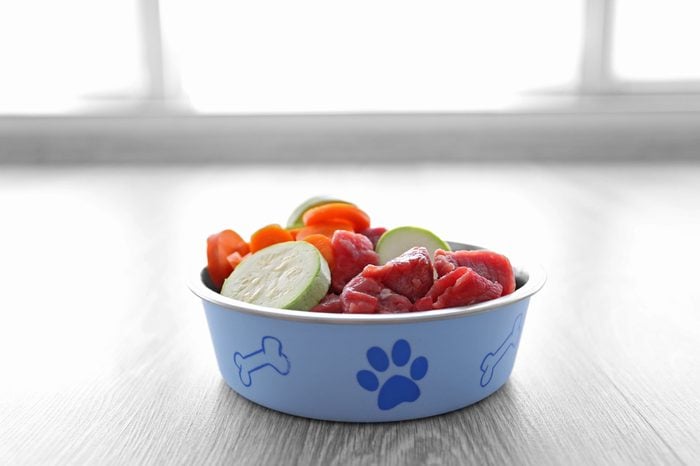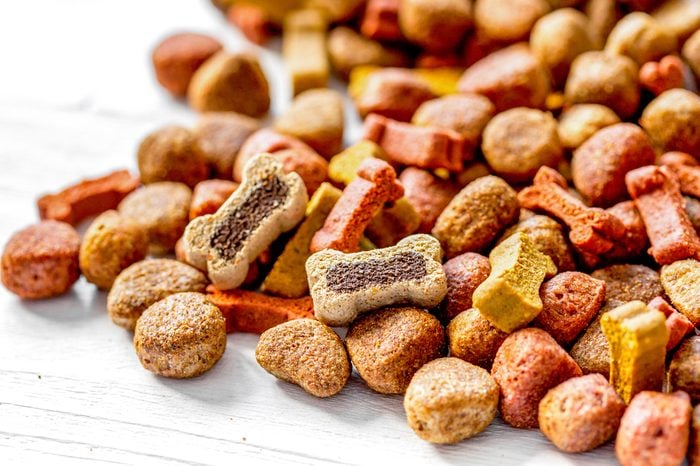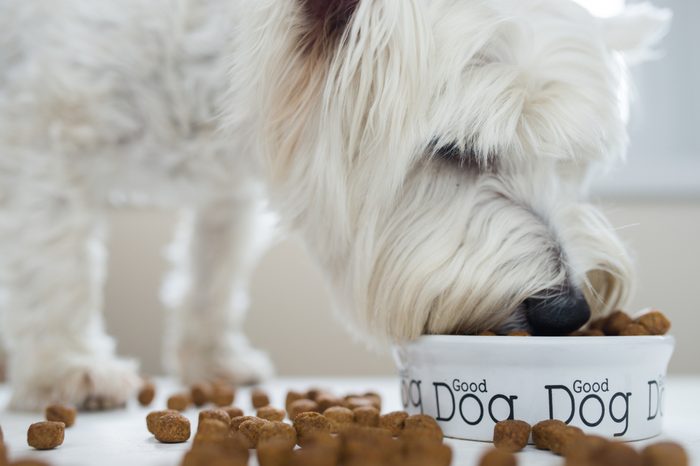
Grain-free may not be the gold standard
When you search for expert recommendations on dog food, one of the first tips is to buy foods that are grain-free. But some grain-free dog foods substitute other ingredients that may be no better than grain—or could be worse. The FDA is currently investigating reports of dilated cardiomyopathy (DCM) in dogs that were fed commercial foods containing legumes, lentils, potatoes, and peas as the main ingredient. “Dilated cardiomyopathy is a heart muscle disease that causes loss of heart muscle strength, enlargement of the heart, and heart failure,” explains veterinarian cardiologist Bill Tyrrell, DVM, DACVIM, of VetSpecialists.com and CVCA Cardiac Care for Pets. Symptoms including acting lethargic, coughing, and difficulty breathing.

It’s showing up in unexpected breeds
What makes these cases of DCM unusual is that the disease is showing up in breeds that aren’t typically predisposed to heart problems. For example, Dr. Tyrrell’s very own dog, a Cavalier King Charles Spaniel, is the poster dog for degenerative valve disease but doesn’t have it. Other giant breeds such as the Great Danes, Newfoundlands, and Irish wolfhounds are also predisposed. According to the FDA news brief, although the disease is less common in small and medium breeds, with the exception of the American and English cocker spaniel, cases of DCM are appearing in breeds such as the golden and Labrador retrievers, Whippets, shih tzus, bulldogs, miniature schnauzers, and some mixed breeds—all of whom ate foods where peas, lentils, other legume seeds, or potatoes were the main ingredients. Look out for these silent signs your dog is sick.

A missing nutrient may be to blame
The problem may not have anything to do with legumes, lentils, potatoes, and peas, per se, but with what those dog food blends are missing—namely, meat and often grains. Meat contains taurine, an amino acid that acts as a building block of protein, which is essential for the health of almost every organ in the body. When it comes to grain-free dog foods and ones with high levels of legumes (such as peas, chickpeas, beans, and lentils) being linked to DCM, low taurine levels could play a role. “In some breeds such as the cocker spaniel and golden retriever, we have found low plasma taurine levels,” says Dr. Tyrrell. And in one study, cocker spaniels with DCM improved when they were given taurine supplements, reinforcing the possibility of a link, according to the Cummings Veterinary Medical Center at Tufts University.

Foods that seem riskiest for your dog’s heart
While it’s true that some breeds will develop DCM simply because they’re prone to it, experts suspect that other breeds are developing DCM likely because of their boutique diet, whether the problem is low taurine levels or something else that so far isn’t clear. Either way, the vets at the Cummings Center have noticed a rise of DCM cases in dogs being fed trendy grain-free diets, and diets with exotic ingredients, including kangaroo, lentils, duck, pea, fava bean, buffalo, tapioca, salmon, lamb, barley, bison, venison, and chickpeas, as well as vegan diets and raw or home-prepared diets. One simple lesson here is that although some brands promote those foods as healthier or more natural than varieties with more traditional ingredients, there’s no evidence to back that up. The need to go grain-free is also a myth. According to vets at Tufts University, “grains do not contribute to any health problems, and are used in pet food as a nutritious source of protein, vitamins, and minerals.”

What your dog should be eating
The short answer: Just about everything (except these potentially deadly people foods). Unless your dog has a food allergy, gastrointestinal issue, or other medical need for a restrictive diet, there’s no need for him to eat a limited-ingredient dog food. And dogs aren’t meant to be vegetarian. “Dogs are omnivores—they need to eat everything, including grains and meats,” says Andrea Antonelli, a veterinarian at Hodes Veterinary Group, which specializes in animal nutrition. Dr. Antonelli only feeds her own dogs food from companies that list percentages of fed and dry matter; “fed” is the moisture content in the food, and “dry” is the actual amount of nutrients minus moisture. It tells you exactly what the nutritional breakdown of that food is. “I tell all my clients to stick with the big brands that police themselves better than anybody else and have the research and the data to back up their foods,” she says.